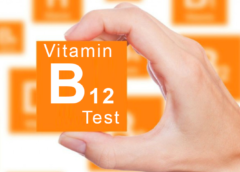Vitamin B12 is a water soluble vitamin which is important for the body to make red blood cells, nerves, DNA and other functions. Vitamin B12 test measures the levels of Vitamin B12 in blood.
Vitamin B12 deficiency can be caused due to inadequate absorption of the vitamin from the diet, pernicious anemia, post surgical treatment causing malabsorption and taking diet deficient in Vitamin B12.
The risk factors for Vitamin B12 deficiency include decreased absorption in ileum which can be seen in patients with Crohn’s disease, resection of ileum and tapeworm infection. Also, in patients having decreased intrinsic factor, there is risk of Vitamin B12 deficiency which can be due to atrophic gastritis, pernicious anemia and postgastrectomy syndrome. Genetic factors such as deficiency of transcobalamin can also be another risk factor. Persons who are older than 50 years, follow a vegetarian diet or are heavy drinkers fall in the category of risk of Vitamin B12 deficiency. Those who have been taking medications for a long time such as using Histamine H2 blocker for 12 months, Metformin for more than four months and Proton pump inhibitor for more than 12 months also are under the risk factor for Vitamin B12 deficiency. Factors such as smoking, drinking heavy alcohol or chronic (from a long time) alcoholism, pregnancy can also cause a deficiency of Vitamin B12.
In case of Vitamin B12 deficiency, the body starts to show signs and symptoms such as anemia, fatigue, weakness, sensations of pins and needles, difficulty in walking, mouth ulcers, inflammation of tongue, shortness of breath, blurring of vision and frequent mood swings.
It is important to treat Vitamin B12 deficiency as very low levels can cause neurological problems and heart diseases.
Interpretation of Vitamin B12 blood test – The normal range of Vitamin B12 is 211 – 911 pg/mL irrespective of sex and age.
- High levels of Vitamin B12 may be seen in kidney failure, diabetes, liver disease etc.
- Low levels of Vitamin B12 may be seen in anemia, hyperthyroidism (high levels of thyroid), worm infection etc.
To treat Vitamin B12 deficiency, Vitamin B12 rich foods in the diet can be included such as fish, red meat, eggs, milk and milk products, legumes, nuts, seeds and soy products. The chances of Vitamin B12 are high in vegetarians as vegetarian foods do not provide complete recovery from the Vitamin B12 deficiency. It can also be taken in form of oral supplements. Vitamin B12 injections are also available in the form of cyanocobalamin which can be administered parenterally or via intramuscular route.
In case, the cause of deficiency of Vitamin B12 is pernicious anemia, parenteral administration of Vitamin B12 is preferred.

Vitamin B12 is also available in the form of gel which can be applied intranasally, which is an alternative to Vitamin B12 injections.
Vitamin B12 deficiency should not be ignored as severe deficiency can lead to blood diseases and neurologic problems.
The amount of Vitamin B12 required by the body differs with age. The recommended doses of Vitamin B12 are as follows:
From birth to 6 months – 0.4 mcg;
Infants (7 – 12 months) – 0.5 mcg;
Children: 1 – 3 years – 0.9 mcg;
Children: 4 – 8 years – 1.2 mcg;
Children: 9 – 13 years – 1.8 mcg;
Teens: 14 – 18 years
Adults – 2.4 mcg;
Pregnant teens and women – 2.6 mcg;
Breastfeeding teens and women – 2.8 mcg.

Leave a Reply
You must be logged in to post a comment.